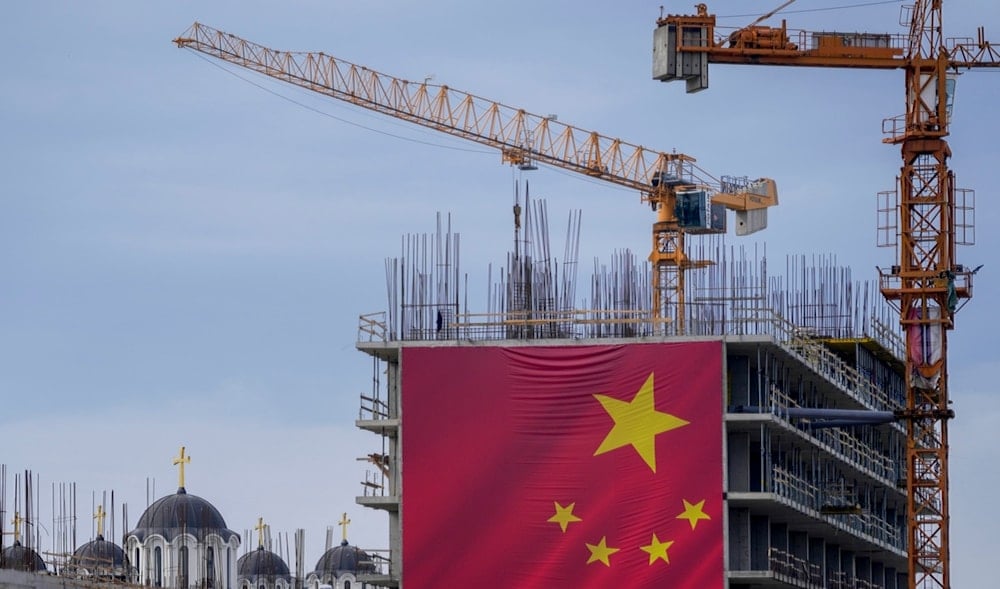China has a trillion-dollar advantage in any tariff battle: WSJ
As Donald Trump prepares for his return to office, his administration is expected to face competition with China, which has moved to be one of the major leading economies in the world.
-

A giant Chinese national flag is seen on a building in front of a church during a welcome ceremony for Chinese President Xi Jinping at the Serbia Palace in Belgrade, Serbia, on May 8, 2024. (AP)
Donald Trump ushered in a new era of economic competition with China when he took office in 2017, but as he prepares for his second term, Beijing's dominance in global manufacturing has grown more than ever before, a report by the Wall Street Journal on Thursday explains.
China has just recorded a trade surplus of around one trillion US dollars with the rest of the world for 2024, according to official data released this week.
The massive gap between exports and imports—roughly equal to Poland's annual GDP—has now tripled compared to 2018, when decades of Western pro-free trade policy were upended by the tariffs Trump imposed on Chinese imports.
Presently, China represents about 27% of global industrial output, according to data estimated by the United Nations, up from 24% in 2018. Therefore, forecasts indicate that by 2030, China's share in industry will rise to 45%, a level of dominance unmatched since the height of manufacturing in the US after World War II or the UK in the 19th century.
For Washington and its allies, this rise shows that efforts to reduce their dependence on China remain insufficient, suggesting that balancing US-China trade relations would still challenge Trump, even if he raises tariffs further.
In recent years, the US has imposed tariffs on billions of dollars worth of Chinese imports and offered subsidies to chipmakers and other companies in strategic industries. Governments from Berlin to Tokyo have adopted similar policies to revitalize their manufacturing sectors and protect strategic champions from Chinese competition.
Regardless, China has responded by finding other customers, supporting its factories, and circumventing tariffs by moving production to other countries. These strategies are helping to keep China's manufacturing base intact for now, despite growing economic troubles, with increased excess capacity, the specter of deflation, and collapsing corporate profits—all weighing on growth.
The result is an increasingly unbalanced global economy, which many Western analysts and politicians fear may struggle to maintain.
China imposes trade restrictions on dozens of US firms
Recently, China announced punitive trade measures targeting several US companies, including Raytheon, Boeing, and Lockheed Martin, signaling a potential escalation in tensions between the two global powers, The New York Times reported.
With just weeks remaining before President-elect Donald Trump assumes office, having pledged to implement new tariffs and sanctions on China, Beijing appears determined to demonstrate its readiness to retaliate, the report indicated.
The Ministry of Commerce in China confirmed that 28 companies have been added to its export control list, citing the need to “safeguard national security and interests.” This move includes banning the export of dual-use items—those with both civilian and military applications—to the affected companies.
Additionally, 10 firms have been placed on an “unreliable entities list” for their involvement in arms sales to Taiwan. These firms are now barred from conducting business in China, with their executives prohibited from entering or residing in the country.
While similar actions have been taken by Chinese authorities in the past, these new measures appear broader in scope. Andrew Gilholm, a China specialist at the consulting firm Control Risks, noted that many of the targeted companies already face existing sanctions.
“Most of this is probably at the symbolic level because so many of these entities were already subject to sanctions,” he said.
“What we’re seeing is the widening scope and number of entities being added in a single listing," Gilholm noted.

 4 Min Read
4 Min Read








